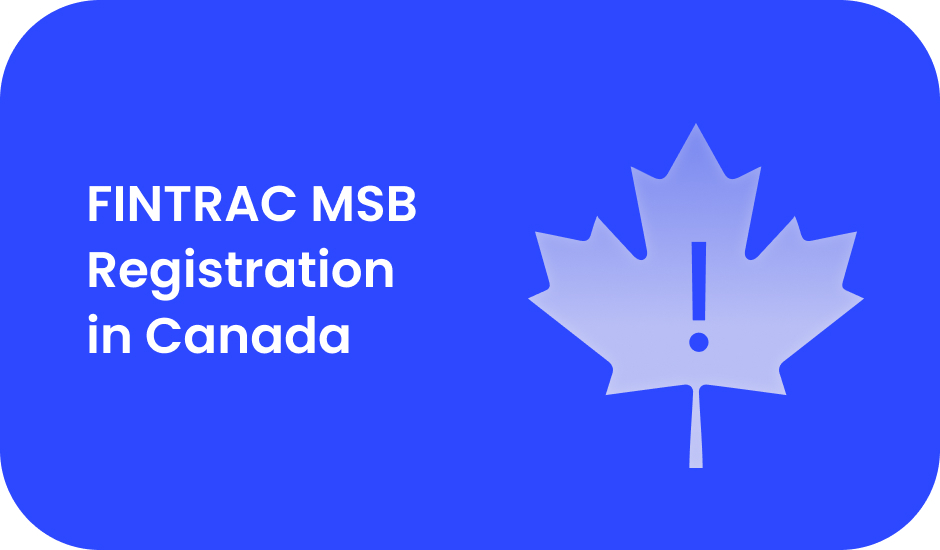In 2024, over 2,700 businesses were registered as Money Services Businesses (MSBs) with FINTRAC in Canada, according to official registry data. That number keeps rising—especially as crypto exchanges, payment processors, and forex companies rush to secure legal standing before onboarding users or partners.
But most companies underestimate how strict the FINTRAC MSB registration process actually is. A completed form isn’t enough. Regulators want clear AML policies, transparent ownership structures, and ongoing compliance—failure in any of those areas could result in rejection, fines, or eventual de-listing.
This guide helps you understand what FINTRAC really expects, how to complete registration step-by-step, and how to stay compliant after approval. Whether you’re a Canadian startup or an international firm targeting Canadian clients, this article shows exactly how to get—and stay—legally registered.
What Is FINTRAC and Why MSB Registration Matters
FINTRAC (Financial Transactions and Reports Analysis Centre of Canada) is Canada’s national financial intelligence unit. Its mission is to detect and prevent money laundering and terrorist financing by regulating financial services providers—including all MSBs.
Any company offering services like currency exchange, international transfers, prepaid cards, or crypto-to-fiat transactions in Canada must register with FINTRAC. Even non-resident companies operating online that serve Canadian clients fall under this requirement.
Without registration, companies risk:
- Bank account closure
- Heavy administrative fines (up to CAD $500,000)
- Criminal liability
- Being publicly listed on FINTRAC’s enforcement notices
Being a licensed money services business isn’t optional—it’s your gateway to legal banking, credible partnerships, and long-term sustainability.
Who Needs to Register as an MSB with FINTRAC
Under Canadian law, your business qualifies as an MSB if it provides any of the following services:
- Currency exchange (fiat-to-fiat)
- Money transfers (domestic or international)
- Issuing or redeeming money orders, traveler’s cheques, or prepaid access products
- Dealing in virtual currency (buying, selling, or custody)
- Foreign remittances or payment processing for third parties
Registration applies regardless of your location. Even a crypto exchange based in Dubai must register if it has Canadian clients or accepts Canadian dollars.
Also, if you’re planning to outsource services to a white-label provider, your legal entity—not just the technology provider—must still be FINTRAC-registered.
FINTRAC MSB Registration Process Step-by-Step
Setting up your MSB registration requires attention to detail. Here’s how the process works in 2025:
- Create a Login Profile: Start by opening a profile through FINTRAC’s MSB Registration System (MSBRS).
- Provide Business Details: Include legal name, business address, ownership structure, types of services offered, and jurisdictions served.
- Upload Supporting Documents: These often include incorporation certificates, AML policies, director IDs, and beneficial ownership declarations.
- Nominate a Compliance Officer: FINTRAC requires every MSB to designate a compliance officer responsible for day-to-day AML adherence.
- Submit Application and Wait: Initial reviews take 2 to 5 weeks. If approved, your registration is published in FINTRAC’s public MSB registry.
Once listed, you receive a registration number and your compliance cycle begins.
How to Use the FINTRAC MSB Registry Search Tool
After registration, your business will appear in FINTRAC’s public MSB Registry—an open database used by banks, partners, and clients to verify the legitimacy of MSBs.
Here’s how to use it:
- Access the Registry: Visit the FINTRAC MSB Registry search page.
- Search by Business Name or Number: Input your registered entity name, MSB number, or location.
- Review the Listing: Confirm service categories, entity status (Active, Expired, Revoked), and registration dates.
- Compliance Check: Make sure all your business details match the current operations. Any inconsistencies can trigger review or suspension.
Banks routinely check this registry before onboarding new MSB clients. If your listing doesn’t appear, is outdated, or flagged, you may be denied basic services like a bank account or payment gateway.
Compliance Obligations After Registration
Registration is only step one. To legally operate as a licensed money service business in Canada, you must maintain full compliance with FINTRAC’s reporting and anti-money laundering (AML) standards.
Here’s what’s expected after approval:
- AML Policy: Maintain a written, implemented policy outlining how your business prevents money laundering and terrorist financing.
- Know Your Client (KYC): Collect and verify ID for all customers above threshold limits. Maintain detailed transaction records.
- Reporting Obligations: Submit Suspicious Transaction Reports (STRs), Large Cash Transaction Reports (LCTRs), and other event-based filings.
- Ongoing Training: Staff must receive regular training on AML rules and reporting duties.
- Biennial Review: Conduct an independent effectiveness review of your compliance program every two years.
Failing to comply can result in warning letters, administrative monetary penalties, or public enforcement action.
Common Mistakes That Lead to FINTRAC Sanctions or De-Listing
Even well-meaning operators get sanctioned. Here are the most common errors to avoid:
- Incomplete Registration Info: Inaccurate business names, ownership data, or service categories trigger delays or rejections.
- Missing AML Program: No policy, no compliance officer, or an outdated document puts your business at risk of suspension.
- Failure to Update Information: Businesses must update FINTRAC within 30 days of any material change—such as address, beneficial ownership, or services.
- Non-Reporting: If you fail to submit mandatory reports, FINTRAC assumes you’re inactive or non-compliant.
In recent years, FINTRAC has publicly fined companies over CAD $100,000 for poor documentation or inadequate AML programs. These records remain public and damage trust with banks and customers alike.
Conclusion
In Canada, operating a money service business legally means more than getting a license—it means staying compliant with AML rules, keeping your business transparent, and building systems that withstand scrutiny.
Whether you’re running a crypto platform, currency exchange, or cross-border remittance service, FINTRAC registration isn’t optional—it’s foundational.














